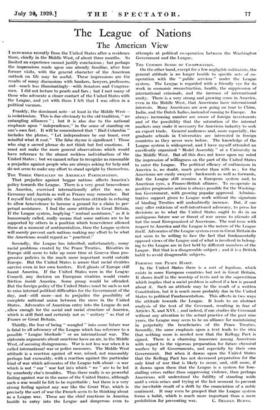THE THREE OBSTACLES TO AMERICAN PARTICIPATION.
That prejudice against beggar nations affects America's policy towards the League. There is a very great benevolence in America, exercised internationally after the war, as Germany and Austria as well as France may remember. But I myself feel sympathy with the American attitude in refusing to allow benevolence to become a ground for a claim to per- petual assistance. I find the same attitude in Great Britain. If the League system, implying " mutual assistance," as it is humorously called, really means that some nations are to be supported by others in a position which benevolence allowed them .at a moment of sentimentalism, then the League system will merely prevent such nations making any effort to be what the Americans would regard as " practical."
Secondly, the League has inherited, unfortunately, many racial problems created by the Peace Treaties. Rivalries in Europe still seem to take up more time at Geneva than pro- gressive policies in the much more important world outside Europe. But the United States is aware that racial rivalries survive even in her own borders. Evil ghosts of Europe still haunt America. If the United States were in the League Council, any decision on European rivalries would create friction inside America. Some group would be offended. But the foreign policy of the United States must be such as not to raise internal political difficulties for the Government of the day, and—still more—not to prejudice the possibility of complete national union between the races in the United States. Advocates of American entry into the League do not , allow enough for the social and racial structure of America, which is still fluid and certainly not as unitary " as that of France or Great Britain.
Thirdly, the fear of being " wangled " into some future war is fatal to all advocacy of the League which has reference to a possible " League blockade " or an international war. The elaborate arguments about sanctions have an air, in the Middle West, of seeming disingenuous. War is not less war when it is called international war or police measures. The Middle West attitude is a reaction against all war, mixed, not reasonably perhaps but excusably, with a reaction against the particular kind of war which advocates of the League talk about—a war which is not " our " war but into which " we " are to be led by somebody else's troubles. Thus there really is no powerful feeling against war in the name of the United States, although such a war would be felt to be regrettable ; but there is a very strong feeling against any war like the Great War, which is precisely the sort of war the French seem to be thinking about as a League war. These are the chief reactions in America hostile to entry into the League and dangerous even to
attempts at political co-operation between the Washington Government and the League.
















































 Previous page
Previous page